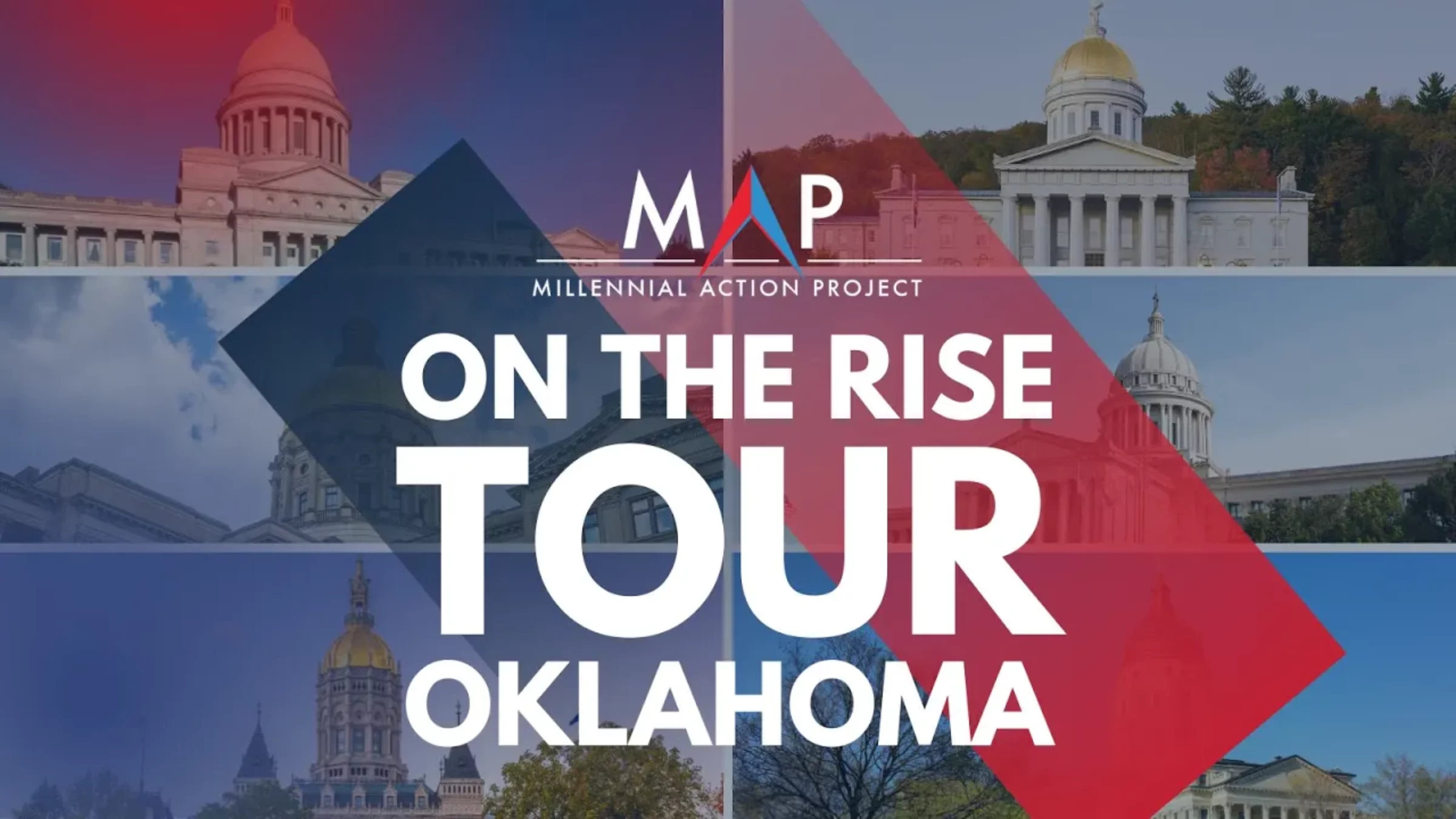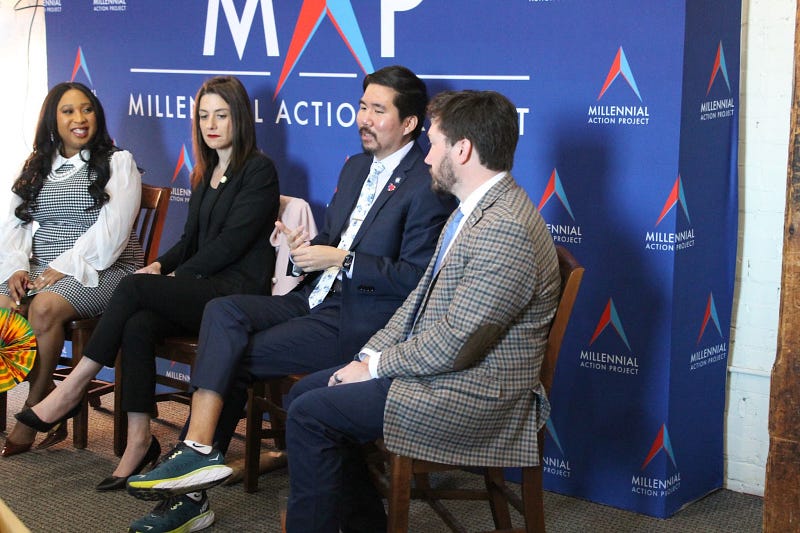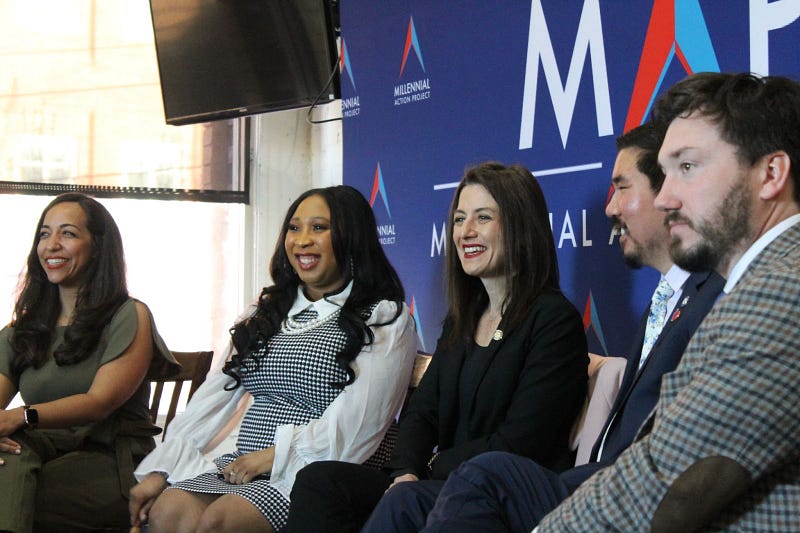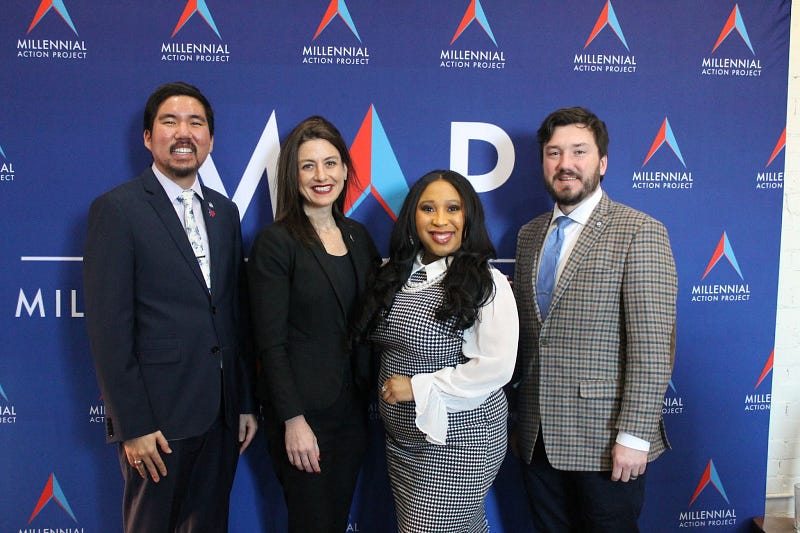ON THE RISE TOUR: OKLAHOMA FUTURE CAUCUS
February 28, 2023

Watch: On The Rise Tour’s Oklahoma Highlights
There’s no denying it: toxic polarization has made it increasingly difficult for policymakers to work together to solve problems. And yet, we need our leaders to address the many seemingly intractable problems that our country faces: issues like climate and energy, jobs and the economy, health, or education.
Last week, we saw young leaders in Oklahoma address these needs as they convened their newly elected Millennial and Gen Z legislators with the Oklahoma Future Caucus (OKFC). In a panel discussion titled “Passing the Torch: How Young Legislators Shape Our Future,” the young lawmakers shared their vision for the upcoming legislative session and how they plan on navigating issues like criminal justice reform, Native issues, and school safety in a bipartisan fashion.
“Happy Tennis Shoes Thursday,” said Rep. Pae, starting the panel with some humor as he poked fun at his neon tennis shoes despite being in a full suit and tie. Through physical appearance alone, it was clear that these young legislators were already shaking things up in their state. A reporter in the audience who covers Oklahoma state politics wrote that the OKFC were “clearly energized, hopeful and focused on getting good things accomplished for their constituencies.”

The mood was truly electric. Young legislators from across the Sooner state came together and discussed cross-partisan solutions. They remained focused on the future with the 2023 Oklahoma legislative session as the central topic, and they brainstormed how young people in politics can work together to create positive policy outcomes for generations to come. The event was led by Future Caucus House and Senate co-chairs, Rep. Ajay Pittman, Rep. Daniel Pae, Sen. Jo Anna Dossett, and Sen. John Michael Montgomery alongside Millennial Action Project’s CEO, Layla Zaidane, who moderated.
Oklahoma is a super-majority state, and yet the Oklahoma Future Caucus has been on the rise since its formation in 2020. The thirst for effective policy making accompanied by the growing numbers of Millennial and Gen Z state legislators (who now make up 26% of the legislature) has been a recipe for success for the caucus. In December, the OKFC won Millennial Action Project’s Cherisse Eatmon Collective Impact Award for its exemplary policy work across the aisle as a caucus. The caucus even made headlines for their ability to work across party lines to address policy areas like criminal justice reform, native issues, and school safety reform.
When asked why the Republican members of the caucus felt the need to work across the aisle given that they are in a super-majority state, the two answered, “I actually don’t view that as an accurate idea that I don’t need the minority party… That’s not accurate… Various times in both my time in the House and Senate, I have bills that would not have passed without bipartisan support,” said John Michael Montgomery (R-OK). His other Republican colleague, Rep. Daniel Pae said, “To me, every single person in the House and the Senate got elected by their constituencies and their voices absolutely matter in the process and fundamentally I believe a good idea is a good idea, whether it comes from a Democrat or Republican.”

The two Democratic chairs further chimed in on what it was like being in a super-majority state, particularly reflecting on whether they ever had to water down their values. “I’ve never viewed it as needing to water down my views or principles… I have, however, taken steps back and been satisfied with baby steps or incremental movement, rather than big, bold movement. In fact, the bill that we [the Future Caucus] are working on together… has a lot of teeth in it… But that starts with taking steps back, being more thoughtful, recognizing what can be done,” said Sen. Jo Anna Dossett, who flipped her Republican district blue this past election cycle.
Rep. Ajay Pittman agreed, “When you stand here growing up in a marginalized community and navigating how people are going to accept you, you learn how to navigate hard situations because that is how your life has been lived. So when I go in, I go in saying ‘no, I am not a sell out to my Democratic population because I go in carrying them with me…’ People are like ‘oh, you are getting crumbs,’ but I look at it like, do you want zero or do you want 50% and that 50% can move to 75% which can move to 85% the next year. It takes time, but nothing is watered down. Everything leads to that next step for my community.”

The panel also discussed their unique backgrounds that led to their venture in public service. “In classic millennial fashion, running for office was kind of a ‘YOLO’ thing… Considering the run was also pretty bipartisan. I had friends on the other side of the aisle encourage me to go to my hometown and run, and so I did… A lot of people in my community were actually really excited to see a young person running,” said Sen. John Michael Montgomerey (R-OK).
“What brought me into public service was serving in a public school classroom for about 15 years… The bulk of that time for about 10 years saw the largest funding cuts to public education in the nation. I remember starting out as a teacher in a time of relative plenty… And as I served in the classroom, I saw those conditions deteriorate… It was after this that I decided I’m going to put my name in the ring,” said Sen. Jo Anna Dossett (D-OK).
It’s clear that the Millennial and Gen Z legislators in Oklahoma are driven to create a better state and in-turn a better future. They capitalize on opportunity and are not afraid to do the work that bridge-building requires. They bring bold voices, and even better solutions to the table.
Oklahoma is just one of MAP’s many points of proof that the Future Caucus model works. It creates a permission structure that unites legislators along their shared generational identity so they might transcend their partisan differences. As we look to a new season of Millennial and Gen Z governing, MAP is excited to continue to empower and convene these young leaders.






Join 1,900+ BIPARTISAN LEADERS NATIONWIDE
Be a part of a network of lawmakers committed to governing effectively, passing more representative public policy, and increasing public trust in democracy.